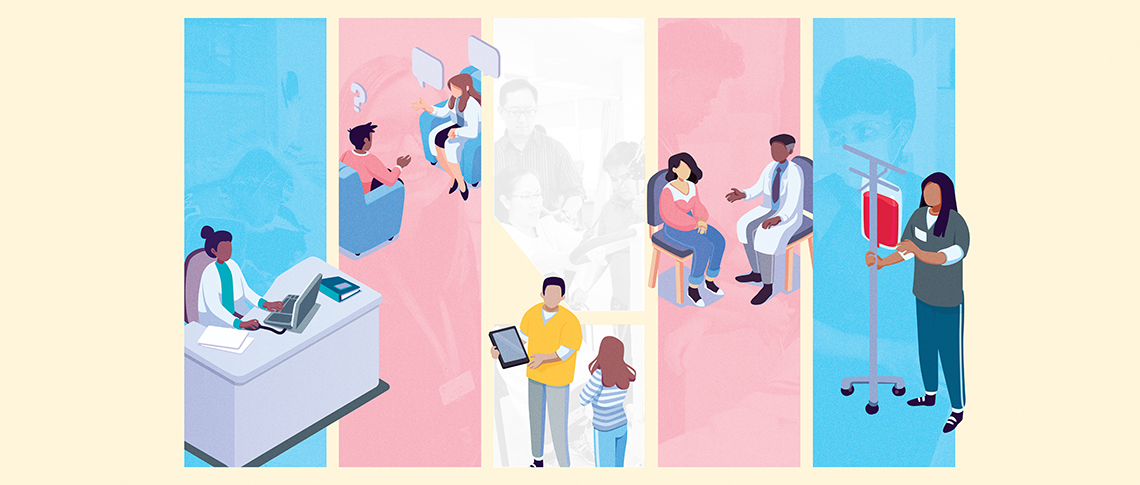

Meet Maria, a 2SLGBTQIA+ community member and psychiatrist who is proud to help make gender-affirming care accessible to more Albertans. Through specialized Adult Gender Clinics, find out how Alberta Health Services (AHS) creates safe environments for those seeking specialized healthcare.
What services are provided at the Adult Gender Clinic?
Our clinic provides mental health services and referrals to more specialized services, including hormone endocrinology, gender-affirming surgeries, and gender reassignment surgery (GRS), which still requires sign off from a psychiatrist and another physician or psychiatrist.
In my role as a psychiatrist, I’m focused on gender-related therapy, and work with clients on topics including social transition, disclosure, body/gender exploration, or conduct more intensive trauma therapy related to gender.
We also have a social worker that helps folks connect with community services and supports younger adults transitioning out of the pediatric world and into adult services.
Why is trans-affirming care important?
This is a big question to answer. Knowledge and education is key—so many trans folks repeatedly have to explain themselves, and even fight for their own validity and right to take up space. This becomes even more distressing if this happens within the health care system, causing a barrier to accessing health care.
We would hope that we would get the care we require when accessing health care but this is not always happening for trans individuals. They are gatekept, rejected, and dismissed so often—usually because people have minimal knowledge or experience with trans people.
I’m regularly told by clients that there are health care workers and physicians that refuse to acknowledge their gender identities in addition to the micro-aggressions they experience on a regular basis from misgendering. So I guess my long-winded answer is it is of the utmost importance. Not only does everyone deserve to access care in a supportive manner, but they deserve to receive this in a way that supports their sense of dignity.
Why is it important for healthcare workers to take extra steps in diversity, equity, and inclusion training? Are there resources at AHS for staff to learn?
I think I mostly answered this in the previous question. I think my only invitation would be to make some of this more obligatory than encouraged. The people getting training are already the ones that want to do better—we need the ones that are content to maintain the status quo. Both the pediatric gender clinic and our clinic do lunch and learns/trainings when requested. There are also so many other community resources —like Skipping Stone Foundation—that provide much-needed information to the public.
How do you make a safe space for your clients?
Well, our hope that the nature of our clinic and its services is a big indicator. We make it a priority to use identified names and pronouns when provided—and if we are unsure, this is one of our first questions. Beyond this, we try our best to follow the client/patient’s lead. We know they are at our clinic for a reason, and being collaborative on goals is imperative. In my office, I have a lot of gender-related décor and work on making the space as inviting as possible. I also try to make each connection relatively informal—I personally hate doctor’s offices and never want folks to feel ill at ease. We take any poor interaction they experience very seriously and try to make the space as validating as possible.
What might surprise people about the services and care provided to trans people at AHS?
If there is surprise over anything, it is our massive waitlist. Folks don’t know that we serve all of Southern Alberta, and that this results in massive wait-times. We are constantly trying to rally more resources and doctors to come to the clinic but even when we can, it can be hard to find office space. We do our best to collaborate with clients, but we are technically a tiny little clinic and we can admit that we lack resources. While we are a passionate bunch, we also have to work within the limits of this health care system.
What is the most rewarding part of your job?
Oh my goodness, EVERYTHING. I know it sounds beyond cheesy, but this is truly my dream job. As someone who belongs to the 2SLGBTQIA+ community myself, I always knew I wanted to work within the community in some way. When this opportunity popped up, I jumped on it.
I cannot even begin to describe how incredibly special and awe-inspiring it is to witness someone getting to be themselves fully and authentically. The resilience and courage I see takes my breath away on a regular basis. Getting to have a tiny part in supporting someone in finally ‘being seen’ is something I will never get used to.